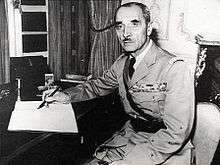Catroux Commission

Georges Catroux
The Catroux Commission was an inquiry by the French government into the French defeat at the Battle of Dien Bien Phu in 1954. Georges Catroux presided over the commission. Their final report ("Rapport concernant la conduite des opérations en Indochine sous la direction du général Navarre") concluded that:
The fall of Dien Bien Phu, in a strictly military perspective, represented a very serious failure but one that in the immediate, that is to say, spring of 1954, did not upset the balance of forces present in Indochina. It only assumed the aspect of a definitive defeat of our forces by reason of its profound psychological effects on French public opinion, which, tired of a war that was unpopular and seemingly without end, demanded in a way that it be ended.
The event itself was in fact, both in terms of public opinion and of the military conduct of the war and operations, merely the end result of a long process of degradation of a faraway enterprise which, not having the assent of the nation, could not receive from the authorities the energetic impulse, and the size and continuity of efforts required for success.
If, therefore, one wishes to establish objectively the responsibilities incurred in the final phase of the Indochina war one would have to examine its origins and evoke the acts and decisions of the various governments in power, that is to say their war policies, as well as the ways in which these policies were translated by the military commanders into operations.[1]
References
- ↑ Arthur J. Dommen. The Indochinese experience of the French and the Americans: nationalism and communism in Cambodia, Laos, and Vietnam. Indiana University Press, 2001 ISBN 0-253-33854-9, page 233, citing Rapport concernant la conduite des opérations en Indochine sous la direction du général Navarre as reproduced in G. Elgey, Histoire de la IVe République, volume 2, annex 1, pages 641–722.
This article is issued from Wikipedia - version of the 7/18/2014. The text is available under the Creative Commons Attribution/Share Alike but additional terms may apply for the media files.